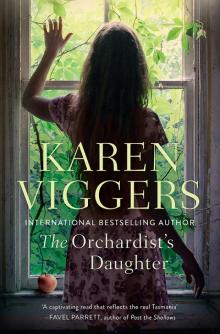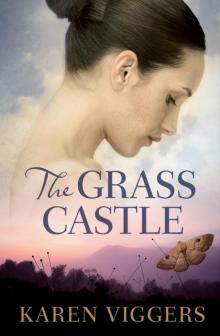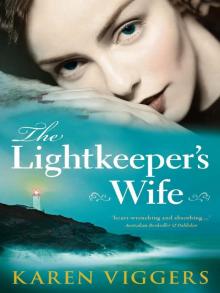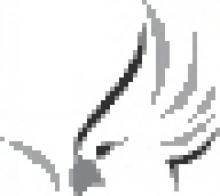- Home
- Karen Viggers
The Orchardist's Daughter
The Orchardist's Daughter Read online
Praise for Karen Viggers
The Lightkeeper’s Wife
‘Absolutely sublime. One of the top ten books of the year.’ —Le journal de la santé
‘heart-wrenching and absorbing … The Lightkeeper’s Wife is a story of love versus passion, right versus wrong, and ultimately, a story of forgiveness.’—Bookseller & Publisher
‘Nature can both isolate and enlighten. Battling the elements can be as much about battling the storms within yourself. In The Lightkeeper’s Wife … Viggers sets the scene in a family dynamic filled with regret, loss and love.’—Australian Women’s Weekly
‘a triumph’—Le Figaro
‘This is a moving story of loss and love, and acceptance of the hand life deals us. It is truly unforgettable reading.’—Woman’s Day
‘Viggers shines in her descriptions of the wilds of Bruny Island and Antarctica.’—Daily Telegraph
‘a song in two voices … Arguably the book of the summer’ —Femme actuelle
‘an emotional, engrossing read, gently but passionately told.’ —Sunday Herald Sun
‘Each page is impregnated with salty sea air, wild waves and rocky coasts, a thousand shades of grey. In the folds of the surf, Karen Viggers has written a beautiful story of loss, memory and the effect of time on our aching souls.’—Lire Magazine
The Stranding
‘a poignant anatomy of loss. It is a memorable story of broken hearts trying to mend, of personal discovery and recovery. Her writing creates seductive land-edge experiences, light off the ocean, wind over sand, weather coming in.’—The Australian
‘There is a raw saltiness to the writing that vividly conveys the wild moods of the ocean, the crippling nature of emotional baggage and the challenges of a whale rescue.’—The Age
‘The Stranding aptly demonstrates how fiction plays a part in revealing the intricate and sometimes fragile bond that we share with nature.’—Wild Melbourne
‘Steeped in natural beauty, it will have you longing for coastal sunsets and afternoons lost wandering empty beaches.’—Laurie Steed, Readings Carlton
The Grass Castle
‘a story that will return to you time and time again’—Sydney Morning Herald
‘quality commercial fiction for which Viggers deserves a strong following.’—Books + Publishing
‘Karen Viggers weaves her tale against the backdrop of our love of the land.’—Yours Magazine
‘Evocative and thought-provoking.’—Newcastle Herald
‘a breath of fresh air that teaches us humility in the face of nature and the courage to face fears. Live rather than survive.’—Le petit crayon
Karen Viggers is a wildlife veterinarian with a passion for people, animals and wild places. As a biologist and researcher, she has worked with native animals in many remote parts of Australia from the Kimberley to Antarctica, and she brings a unique set of perspectives to Australian contemporary fiction. Her novels have been translated into several languages. In 2016, The Lightkeeper’s Wife (La Mémoire des embruns) was awarded the Les Petits Mots des Libraires literary prize and was short-listed for the Livre de Poche Reader’s Choice award. This novel was on the French national bestseller list for more than 42 weeks, going as high as No. 3. The Orchardist’s Daughter is Karen’s fourth novel. You can read more about Karen and her books at www.karenviggers.com
Also by Karen Viggers
The Stranding
The Lightkeeper’s Wife
The Grass Castle
This is a work of fiction. Names, characters, places and incidents are products of the author’s imagination or are used fictitiously. Any resemblance to actual events, locales, or persons, living or dead, is entirely coincidental.
First published in 2019
Copyright © Karen Viggers 2019
All rights reserved. No part of this book may be reproduced or transmitted in any form or by any means, electronic or mechanical, including photocopying, recording or by any information storage and retrieval system, without prior permission in writing from the publisher. The Australian Copyright Act 1968 (the Act) allows a maximum of one chapter or 10 per cent of this book, whichever is the greater, to be photocopied by any educational institution for its educational purposes provided that the educational institution (or body that administers it) has given a remuneration notice to the Copyright Agency (Australia) under the Act.
Allen & Unwin
83 Alexander Street
Crows Nest NSW 2065
Australia
Phone: (61 2) 8425 0100
Email: [email protected]
Web: www.allenandunwin.com
ISBN 978 1 76063 058 4
eBook ISBN 978 1 76087 051 5
Author photo (p. iii) by Michelle Higgs
Cover design: Lisa White
Cover photograph: Stephen Carroll / Arcangel; Shutterstock (apple)
For David,
who has dedicated his life’s work
to studying the mountain ash forests of Victoria
and
For my sister Fiona,
who understands where the heart resides
within the story of life
Contents
Prologue
PART 1 Seeds
1
2
3
4
5
6
7
8
PART II Germination
9
10
11
12
13
14
15
16
17
18
19
20
PART III Growth
21
22
23
24
25
26
27
28
29
30
31
32
PART IV Understorey
33
34
35
36
37
38
39
40
41
42
43
44
45
46
Epilogue
Acknowledgments
Only the untamed forest
is home to that silence which
is union with the divine. And only
the forest creatures grasp that
being in the single moment is all.
Jane Baker, ‘Church’ (unpublished)
We dance to the echoes of our own gods.
John Karl Stokes, ‘A River in the Dark’, Chant No. 6,
Riverwater: Eight chants from the Clyde River
Prologue
She was asleep when it happened, so she didn’t hear the embers collapse as the log rolled from the fireplace onto the floor. She was dreaming of escape: tearing off her apron as she ran barefoot down the long potholed driveway, past the lines of twisted apple trees and onto the gravel road that led away from here. In her sixteen years, she’d only been down that road once. It led to another world, where perhaps God was kinder and someone else helped with the jobs.
The others were asleep too, so nobody heard the clothes rack slump onto the log. Nobody noticed the flames licking at the crumpled clothes, stroking with liquid fingers, fizzing in the fibres. Nobody saw the fire ignite the faded carpet and the worn, sagging furniture, the pedestal with Father’s leather-bound Bible.
In her dreams, she was walking towards a different horizon. A carpet of trees. Shifting shadow and light.
A voice floated around her, waxing and waning, warping, disintegrating. She struggled to make out the words.<
br />
Then the voice became clearer. Her brother shouting, ‘Get up!’
Something crashed into her room and she opened her eyes. Smoke billowed like thick fog and a cough punched her chest. Her brother loomed over her, his hands rough on her shoulders, shaking her, encouraging her to move. But she couldn’t breathe. She was smoke-addled. Ragdoll loose.
An insistent sound rumbled through the house, vibrating and roaring; she felt it in her skin, in her bones, everything humming to its rhythm. The smoke had thinned and the light was surreal. Orange. Flickering.
Her brother pulled her from bed and she slumped to the floor. Around her, she heard crackling and hissing, and an evil heat radiated from the door.
Was this hell? Had God come to punish her?
Her brother hauled her across the room, wrenched open the window, and shoved her out, dropping her among the rosebushes. She landed on hands and knees, gasping, smoke scraping her chest, no air in her lungs. Thorns snagged her skin and tore at her hair as she dragged herself free.
She crawled to the driveway and hunched there, struggling against faintness until her throat released and she sucked in a lungful of air, a rasp drawn through her body.
The house was burning. Smoke poured from under the eaves, and flames clawed the sky. As she watched, a trickle of flame shimmied up the pine tree beside her bedroom, racing up the trunk, along the branches, through the needles, snapping and popping. Transfixed, she huddled, mesmerised, terrified, as the whole tree lit up.
But where was her brother? Her parents?
Stumbling to her feet, she ran around the house on the circular driveway, toes crimping on gravel.
No one.
There was no way back in. The house was alive with fire. She stood powerless, watching it burn. Flames in the lounge room, in their parents’ room, behind the windows. Somewhere, the tinkling of glass. Clumps of ceiling were dropping like stones. Her brother was taking too long.
When it seemed the whole house had been converted to hell and that everyone must be dead, he lurched from a window. Flames danced on his back, and he tumbled to the ground, rolling frantically, then ripped off his woollen jumper and flung it away.
In the leaping light of the blaze, he staggered across to her, soot-blackened and gasping, eyebrows singed.
He was clutching something to his chest: Father’s black leather folder.
When she looked in his eyes, she knew her parents were gone.
PART I
Seeds
1
Leon drove into town on a clear autumn Saturday. Blue skies, leaves turning golden, a hint of smoke in the air. He felt optimistic. New home, new job, new life—he was going to make this work. For too many years he’d been living on Bruny Island with his folks. He’d had his reasons for being there, but it was time to move on. This was a fresh start, and no matter what his dad said, Leon was up for it. Being a Parks ranger in a timber town would bring challenges, but there were ways to fit in—you just had to find them.
He would miss the island, there was no doubt. He loved its wild beaches, columnar cliffs and shifting winds. The sea frothing against the shore. The still waters of the channel with its hook-necked, red-beaked black swans. Dragging his kayak across mudflats alive with waterbirds and scuttling crabs. But he’d left all that behind and now he was here. At least he was still in southern Tasmania, and working among forests and trees, which were in his blood.
Pretty much everything he owned was in his old red car. Kayak on the roof-rack. Box of books in the back. A few folding chairs. Suitcase stuffed with worn clothes. Hiking boots. The down sleeping-bag he’d bought when he was studying in Hobart. Oh, the trips he’d planned: big multi-day hikes in southern Tasmania that never eventuated because he’d had to move home. It had been a necessity—his mum had needed him. He would never forgive his dad for wrecking his life and ruining hers.
But today none of that mattered. Twenty-five wasn’t too late for a new beginning, and he was excited. This was the first opportunity he’d had in forever.
He drove slowly up the main street, surprised at how busy it was. Parking spots clogged with cars. Muddy kids in footy jerseys. People pushing trolleys and lugging shopping bags. Tourists spilling from a coach outside the visitor centre. He checked out the shops: post office, pharmacy, butcher, baker, bank, cafe, takeaway next to the supermarket, hardware at the top of the street. Back home in Adventure Bay where his parents lived, peak hour was twice a day for sixty seconds when the bus came through with tourists for the scenic boat trip around the coast. The only shops were the general store and cafe, so this place was a metropolis in comparison. He would be set here for most things he needed. Anything else he could buy down near the Parks office, in the last town he’d passed through. He could have rented closer to work, but he’d decided to live here, at the foot of the mountains—the springboard to his new future.
He crossed the highway into a quiet street lined by weatherboard houses with white window frames, walls of firewood piled along fences, smoke wafting from chimneys. Turning a corner, he headed uphill past a brick house half-hidden by rose bushes, a log truck parked on the kerb, a vacant block with a scarecrow in an overgrown vegie patch, then another weatherboard with an old blue car set on stumps down the side.
Further upslope were his new digs: a little pink house backing onto bush—he recognised it from the photos on the website. It was part of a deceased estate, cheap rent and semi-furnished, which suited him because he didn’t have furniture. Before moving back in with his parents he’d been in a student house in Hobart with shabby old armchairs and a stained sofa, none of which had been worth keeping.
Pulling up on the gravel driveway, Leon assessed his new premises. The agent had said it was occupied until recently, but it looked closed-up and neglected. The grass was long. No front fence and no garden. The uphill boundary with the bush had five-strand barbed wire, and the low paling fence that divided him from his neighbours was bolstered by firewood, all on their side.
He slid out into cold air that was heavy with wood smoke and the sweet smell of cows in the paddock across the road. Next door, a red heeler with a big belly and long teats trotted to the fence and barked at him—the welcoming committee. Leon mounted the steps to the front door and poked the key in the lock. It was stiff and the door wouldn’t budge, so he shoved it with his shoulder to get in.
The house was almost empty. Nothing in the lounge room except a pile of rubbish in the fireplace. Skewed venetian blinds at the windows. Mantelpiece thick with dust and possum shit. In the bedroom: a squeaky bed. He sat on the bed frame, and springs poked his bum. Underneath, on the floor, he found a rusty chamber pot. The old lady who’d lived here must have been incontinent. Suddenly the bed looked even less appealing.
He continued his tour of the house. In the kitchen, two vinyl chairs spewed stuffing from their seams, and possum shit was everywhere. He screwed up his nose. What had happened to recently vacated and partly furnished? This wasn’t what he’d signed up for. He considered calling the agency and blasting them. Then he sighed. He wanted to be a new person here, the sort of man who didn’t snap to anger, different from his dad. There were ways to sort things. He had a couple of days to clean up before starting work. Tomorrow he would use some savings and buy a new mattress, maybe find cheap furniture at garage sales. But it was a shame the place was such a mess. The irony of it almost made him smile. Three years of dealing with the emotional mess at home, and now this. The grime was daunting, but it would be easier than looking out for his mum whenever his dad was tanked.
Outside, he lifted his kayak from the car and stashed it alongside the house. Then he lugged in his gear and dumped it on the floor. Where to begin? He would start with the fireplace, because any bet the house wouldn’t be insulated and he would freeze tonight if he couldn’t light a fire … assuming there was wood.
When he searched out the back there was none.
In a cupboard he discovered an old radiator, so he plugge
d it in. The stench of burning dust permeated the lounge room, then the power snapped off; the radiator had shorted everything out. He checked the fuse box and switched the power back on, but there would be no heating until he organised a delivery of wood. He found a number on a fridge magnet and arranged for a load to be dropped off that afternoon.
After he’d carted the rubbish to the bin, he wiped down the mantelpiece with an old rag from the car, scrubbing away sticky dots of possum piss and shrivelled clumps of poo. When it was clean, he set his books on it: field guides and history books, then his favourite fiction, all set in Tasmania: For the Term of His Natural Life, Death of a River Guide, The Roving Party. Somehow the books made the house feel more of a home. They were part of him and their presence made it easier to tackle the rest of the chores. Each time he walked past, he imagined himself reading by the fire on cold nights—it was heartening. But the cleaning wasn’t going so well. The damp rag wasn’t sufficient to shift the dirt, so he traipsed down to the supermarket and bought a bucket and mop, bleach, disposable cloths, a scrubbing brush. Back at the house he began sweeping, mopping, wiping with his new gear. The whole place needed attention. And then there was the algae-stained loo.
His mum rang as he was tossing a bucket of scummy water on the grass. ‘Leon,’ she said, as if they hadn’t spoken in months, ‘how are you? It’s quiet here without you.’
He thought of her standing at the tulle curtains, looking out across the lawn to the street. Yes, it would be quiet back home. Weekdays, she would be busy cleaning cabins at the caravan park. But weekends, she’d be stuck in the house with his pensioned-off dad. Minnie the cat would be curled on the couch or weaving her way around his mum’s legs. In the main bedroom, his dad would be propped up with pillows watching TV: a footy replay, or maybe a golf tournament. Across the road, small waves would be tumbling onto the sand and hissing up the beach. Leon checked his watch—the morning tourist boat would almost be back.

 The Orchardist's Daughter
The Orchardist's Daughter The Grass Castle
The Grass Castle The Lightkeeper's Wife
The Lightkeeper's Wife The Stranding
The Stranding